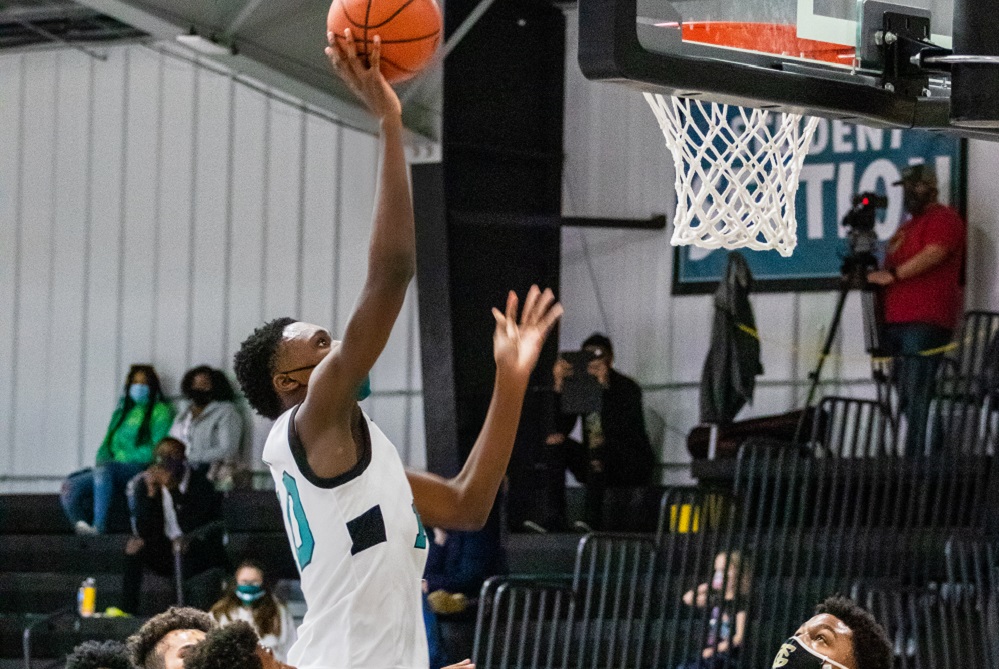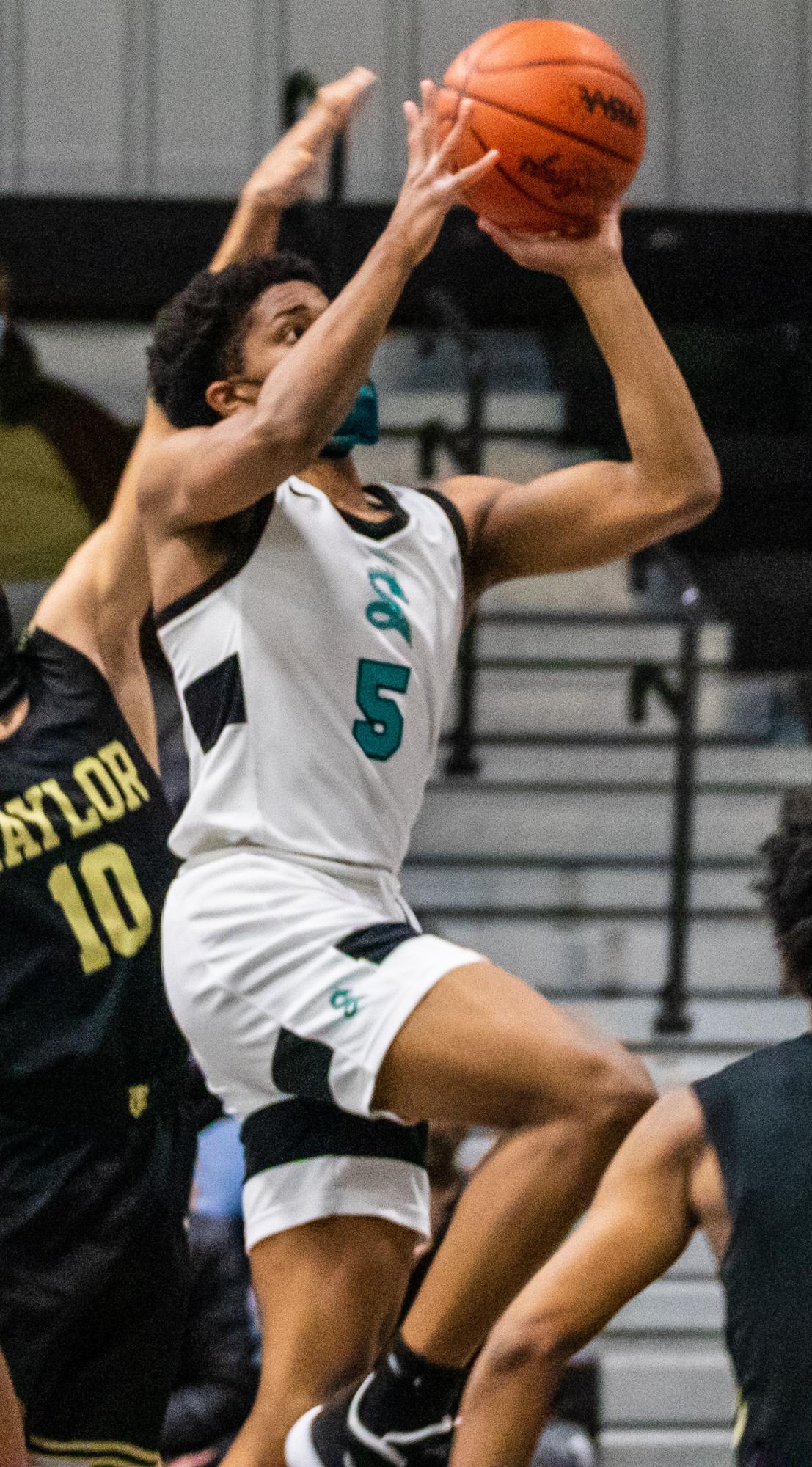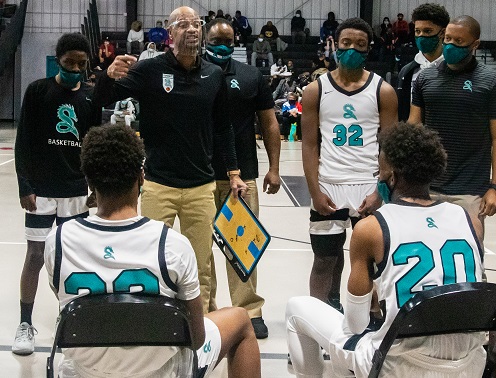
Erik O, Legend on the Microphone
By
Geoff Kimmerly
MHSAA.com senior editor
March 21, 2013
One of Erik O. Furseth’s favorite moments every March – perhaps the one he looks forward to most – comes during the hour before each MHSAA Basketball Semifinal.
From his familiar seat on press row, Furseth has called hundreds of Michigan State University and MHSAA Finals basketball games.
But the opportunity for high school teams to play at Breslin Center is not lost on him, especially as he watches players and fans enter the arena for the first time.
“(It’s) the kind of awe that overtakes people when they come there,” Furseth explained earlier this month. “The enthusiasm reflected on the kids there and so on.
“What a thrill for those kids to come and play a ballgame there.”
Now imagine Furseth saying this with the voice that’s become legendary to generations of basketball fans across this state.
Furseth, 82, has been a member of the MSU basketball family for more than 60 years. A player first, he since served as the homecourt voice of MSU basketball from 1968-02 and MSU football from 1971-98, and this weekend is continuing a run of calling MHSAA Boys Basketball Finals that began more than four decades ago while those games still were played at Jenison Field House.
Some of his phrases are on ready recall for those who have sat in his audience.
“The clock is correct and official.”
“Yesssss … on the basket!”
“Heeeee gets the bonus.”
Last weekend, Furseth also called his sixth MHSAA Girls Basketball Finals, and he’s announced MHSAA football championship games since their days at the Pontiac Silverdome and Baseball Finals for a decade. Furseth also just finished his third season as voice of Traverse City St. Francis football and girls and boys basketball.
“Erik is able to make that job not just a game, but an event,” St. Francis athletic director Tom Hardy said. “To have somebody of his caliber, with his recognition, in a small gym in Traverse City … whether there are 100 people or it's standing room only, it’s so great to know the professionalism of that is taken care of. He just understands kids.”
Furseth moved from East Lansing to Traverse City 18 years ago. That he would find his way to the microphone in his new hometown makes sense. But that it became the tool of his trade the last half-century certainly would be considered a detour from his original plan when Furseth turned down a chance to play football for Woody Hayes so he could study forestry in East Lansing.
Life-changing moments
“Erik O. on the radio” was the voice of Lansing rock-n-roll radio during the 1950s and 60s.
“He was the number one disc jockey in this area before they were called disc jockeys,” said Lansing WILX sports director Tim Staudt, who grew up in East Lansing and has worked in mid-Michigan television for four decades and as a daily radio host for 20 years.
“He has the all-time greatest voice, and obviously it's held up to this day.”
Furseth grew up in Cleveland Heights, Ohio, and got to know Hayes while the soon-to-be-legendary coach was finishing his tenure at Denison University. Hayes hoped Furseth, a high school football standout, would become part of the coach’s first recruiting class after taking the job at Miami (Ohio) before the 1949 season.
But Furseth, who had vacationed in Michigan growing up, was drawn to MSU’s forestry program. So he made a trip to campus – picked up by then-assistant Duffy Daugherty for a visit with head coach Biggie Munn – and was sold on coming to East Lansing instead.
It didn’t take long for his future to turn in an unplanned direction.
Furseth was injured his first fall with the Spartans, and he never played a down of college football. But at that time, MSU sent all freshmen who had played high school basketball a card encouraging them to try out for the Spartans’ freshman hoops team. Furseth, also a 6-foot-3 post player in high school, not only made that MSU team but played three seasons on the varsity under another future coaching legend – Pete Newell, who would go on to lead teams to NCAA and Olympic championships. Furseth played in MSU’s first Big Ten game, against Northwestern in 1951.
 It was during sophomore year that Furseth’s academic future also changed lanes. Forestry students were required to take a soil science class offered only during the winter and from 3-5 p.m. – a conflict with Furseth’s basketball commitments. He dropped the class, dropped the major, and as a junior switched course of study to communications.
It was during sophomore year that Furseth’s academic future also changed lanes. Forestry students were required to take a soil science class offered only during the winter and from 3-5 p.m. – a conflict with Furseth’s basketball commitments. He dropped the class, dropped the major, and as a junior switched course of study to communications.
MSU basketball’s announcer at that time, Larry Friedmeyer, was among a few who took note of Furseth’s deep and authoritative tone, and suggested he audition for the campus’ WKAR radio station. Furseth was hired at 75 cents an hour to host a few nights each week of “The Concert Call,” a classical music program, and later that year joined local station WILS to read the evening news. After serving in the Air Force, Furseth returned to WILS – and a star was born.
Furseth was a DJ for WILS for 14 years. On Saturdays for a decade, he hosted dances at the Lansing Civic Center that drew 1,000 teenagers a night – and one evening, included a surprise drum performance by a famous student at the local Michigan School for the Blind, known then as Little Stevie Wonder.
Furseth later managed WILS from 1956-68. “Being the manager made it no fun anymore,” Furseth noted.
He left for a job outside of radio. But the fun returned when his announcing career began.
Erik O on the microphone
The “O,” by the way, stands for Olaf. Furseth’s parents are from Norway. “Erik O” was a smooth radio name early in his career when he was filling in for mentor Dave Froh – “Erik O for Dave Froh” – so it stuck.
In his role at a basketball game, Erik O admittedly doesn’t see much of it – at least, as a fan might. He can say his top three MSU players during his time as announcer were Scott Skiles, Magic Johnson and Johnny Green. But for the most part, Furseth focuses on the factual information he must supply with every substitution, foul and break.
He found that winning formula long ago.
“He’s just a nice guy – and nice guys don’t usually last on the air as long,” said Lansing sports radio personality Earle Robinson, who recently retired after 39 years at WKAR. “He’s always had good relationships and such a pleasant personality.”
“You’d never know he was a basketball player or anything. He’s very free of any ego, very helpful to people and generous of his time,” said longtime MSU men’s basketball broadcaster Gus Ganakas, who formerly coached the Spartans from 1969-76 and was an assistant on Furseth’s freshman team.
“And particularly in basketball, he knew what he was doing. He’s a former player and has a background as an athlete, and he has a pleasing voice. I’ve always admired him because of his devotion to what he’s doing.”
High school sports are high on that list.
Furseth enjoys announcing the seventh and eighth grade football teams that play at Traverse City’s Thurlby Field – “They think they’re big time,” he said – and finds it incredible how much the high school teams can improve over the course of a season.
He relishes the camaraderie he sees at Class C St. Francis, and wishes he’d attended a similarly-small school himself. To a player who was wearing his former number, he said, “You’re wearing my number. Do it right.” And the St. Francis boys basketball team felt at home at Breslin Center in 2012, when it finished runner-up to Flint Beecher while a familiar voice called the action.
Furseth recalled earlier this month. “Really, for me, high school (sports) exemplifies the development of our kids athletically and in many other ways. You learn a lot of things in athletics.”
“When I think about my life, to think something I started led to doing this; I’m thrilled that it happened,” Furseth said of returning to another Finals. “It’s always been a great thrill for me to do it.”
PHOTOS: (Top) Erik O. Furseth calls the Saginaw/Rockford Class A Boys Basketball Final last season at Breslin Center. (Middle) Furseth prepares to call another game during the 1999 Boys Finals weekend at Breslin.

Romulus Summit Academy Continuing Impressive Climb
By
Tom Markowski
Special for Second Half
March 17, 2021
As a co-founder of Romulus Summit Academy, Leann Hedke was intent on creating an atmosphere conducive to academic achievement.
 Summit opened its doors in Flat Rock in 1996 for grades K-5, soon expanding to K-12 once the school moved to Romulus the following year. According to Hedke, in the last 10 years 100 percent of those graduating were accepted to a college or university.
Summit opened its doors in Flat Rock in 1996 for grades K-5, soon expanding to K-12 once the school moved to Romulus the following year. According to Hedke, in the last 10 years 100 percent of those graduating were accepted to a college or university.
Also, according to a 2017 report, Summit had the highest graduation rate among charter schools in Michigan and was ranked in the top 50 by graduation rate during the 2015-2016 school year. Summit, rated No. 17, had a graduation rate of 98.58 percent, nearly 20 percent better than the state average of 79.65.
Mission accomplished.
But something was missing: a competitive athletics program. Often a viable athletic program will enhance academics. A competitive athletic program can generate enthusiasm and give students a reason to be proud of their school, in addition to academics.
Summit Academy North High School didn’t sponsor varsity sports until the early 2000s and, frankly, they weren’t very good, particularly in the sports of boys basketball and football. From 2004-2016 the football team boasted three winning seasons and made the playoffs once (2007). Until the 2019-20 season, the most wins the basketball team totaled was 10.
“Our focus has been on the scholar-athlete,” Hedke said. “We focus on academics. Our GPA (grade-point average) requirements are higher than what the (Michigan High School Athletic Association) requires.”
Hedke said there’s been quite of bit of turnover in the coaching ranks in boys basketball over the years. Part of this is due to the lack of success, as far as wins and losses, but some of this can be attributed to the high standards Hedke and her fellow administrators demand. Swearing is taboo, and a coach is expected to be a stickler for discipline, and must adhere to a strict decorum.
With the backing of Summit athletic director William McKoy, veteran coach Mark White, less than a month before the start of the season, was hired in November of 2018. Summit was 9-12 during White’s first season before showing vast improvement last winter finishing 16-4. Highlighting that season was the school’s first division title (within the Charter School Conference) and a spot in a Division 2 District Final against Flat Rock. Summit has never won a District title so this game loomed as the most important in school history.
Then COVID-19 hit, ending the season.
 Summit returned four starters from that team and is off to a 15-0 start with the MHSAA Tournament less than a week away. Most of its victories have been by double digits including last Saturday’s 71-53 victory over Taylor, a Division 1 school, and Tuesday’s 72-46 victory over Detroit Community in a conference tournament quarterfinal. Summit’s semifinal is scheduled for Thursday.
Summit returned four starters from that team and is off to a 15-0 start with the MHSAA Tournament less than a week away. Most of its victories have been by double digits including last Saturday’s 71-53 victory over Taylor, a Division 1 school, and Tuesday’s 72-46 victory over Detroit Community in a conference tournament quarterfinal. Summit’s semifinal is scheduled for Thursday.
Two wins stand out in particular, and both came on the road. Summit defeated Harper Woods Chandler Park Academy, 54-51, on March 1 and then upset No. 3-ranked (in Division 2) Detroit Edison, 49-46, on March 8. Edison’s only other loss this season was to Warren De La Salle Collegiate, a Division 1 school, 72-68. Both Chandler Park and Edison are Charter School Conference members and have had strong programs over the years.
White starts one senior, guard Jamel Johnson, who’s averaging 10 points per game and was selected second-team all-conference. Sophomore James Wright averages 17 points and nine rebounds. White’s top player is junior and three-year starter Orlando Lovejoy, Jr., a 6-2 guard who was selected conference player of the year. His 23 points led Summit in its victory over Community. Lovejoy averages 21 points, 10 rebounds and seven assists per game.
“All of our players got better during the offseason,” Lovejoy said. “(White) is an intense coach. He’s demanding. He’s constantly pushing us. He’s a perfectionist.”
Much of the credit goes to White for the recent success, but one can’t overlook the talented players within the school. Take the recent success of the football program for example. The football team was 0-9 in both 2015 and 2016. The Dragons went 5-4 the next two seasons before finishing 8-3 in 2019, a run which included an 18-12 victory over Redford Union in a Division 4 District opener, the program’s first playoff win. This past regular season was shortened to six games because of the pandemic, and Summit won two playoff games finishing 7-2.
“Summit is an excellent school,” White said. “They’re in line with what I want to be as a coach.
“There are more accolades for a team that hasn’t been that good in the past. (Winning) has never been done before here. I feel the best is yet to come, and not just for the team, but for the school as well. Gaining recognition in basketball helps promote the school. People will find out about how good Summit is as a school.”
Winning is anything but new for White. His first season as a head coach was at his alma mater Detroit Renaissance in 1998. In 2000 Renaissance, which had never played for a Detroit Public School League title, won the PSL defeating Detroit Redford, 41-37, in the championship game. Renaissance won the title again in 2002 and 2003. Renaissance then won two MHSAA Class B titles (2004, 2006) under White.
White left Renaissance after the 2005-06 season to become head coach at Adrian College, another alma mater. He spent seven seasons there before returning to the high school level at River Rouge. White guided River Rouge to the Class B Semifinals in 2017 and 2018.
White said he couldn’t be happier, at this time in his professional life, than he is now at Summit. In addition to his duties as the boys basketball coach, White is also the school’s academic interventionist and assistant athletic director.
 Lovejoy is aware of the success his coach has had at other schools. And even though Summit hasn’t achieved that type of success, he said anything is possible.
Lovejoy is aware of the success his coach has had at other schools. And even though Summit hasn’t achieved that type of success, he said anything is possible.
“We want to win our conference tournament, a District and Regional title, and the states,” Lovejoy said. “To some that’s farfetched, but it is realistic. We’re with a coach who’s done it before.
“This is special. (Summit) has never won a District, and here we are undefeated. We’re soaking it all in. We want to give the school something to cheer about.”
Lovejoy and his teammates recently gave Hedke a gift from their hearts. It’s a poster, a collage of sorts, with photos of the team in addition to pictures the players painted. This was in response to Hedke being a cancer survivor. She was diagnosed with breast cancer this past November and now is cancer-free.
“Mark is a wonderful coach,” Hedke said. “He focuses on what (the players) do well. He talks about who they are and what they represent. He teaches them to be aware. When I was going through my cancer, he told the players that we’re fighting on the court to win a game. She’s fighting for her life.”
The players have since dedicated their season to Hedke.
 Tom Markowski is a correspondent for the State Champs! Sports Network and previously directed its web coverage. He also covered primarily high school sports for the The Detroit News from 1984-2014, focusing on the Detroit area and contributing to statewide coverage of football and basketball. Contact him at [email protected] with story ideas for Oakland, Macomb and Wayne counties.
Tom Markowski is a correspondent for the State Champs! Sports Network and previously directed its web coverage. He also covered primarily high school sports for the The Detroit News from 1984-2014, focusing on the Detroit area and contributing to statewide coverage of football and basketball. Contact him at [email protected] with story ideas for Oakland, Macomb and Wayne counties.
PHOTOS: (Top) Raevon Thomas (10) gets up a shot during Summit Academy’s Senior Night win over Taylor. (Middle) Summit’s Orlando Lovejoy makes a move to the basket Saturday. (Below) Dragons coach Mark White huddles his team. (Photos by Aaron Goodman.)

